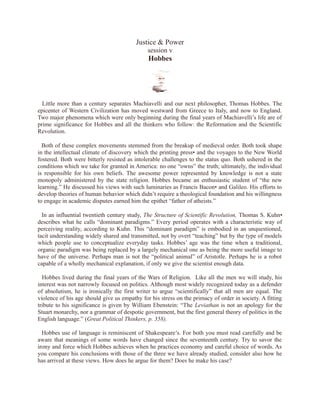
Hobbes' Theory of Justice and Power
- 1. Justice & Power session v Hobbes Little more than a century separates Machiavelli and our next philosopher, Thomas Hobbes. The epicenter of Western Civilization has moved westward from Greece to Italy, and now to England. Two major phenomena which were only beginning during the final years of Machiavelli’s life are of prime significance for Hobbes and all the thinkers who follow: the Reformation and the Scientific Revolution. Both of these complex movements stemmed from the breakup of medieval order. Both took shape in the intellectual climate of discovery which the printing press• and the voyages to the New World fostered. Both were bitterly resisted as intolerable challenges to the status quo. Both ushered in the conditions which we take for granted in America: no one “owns” the truth; ultimately, the individual is responsible for his own beliefs. The awesome power represented by knowledge is not a state monopoly administered by the state religion. Hobbes became an enthusiastic student of “the new learning.” He discussed his views with such luminaries as Francis Bacon• and Galileo. His efforts to develop theories of human behavior which didn’t require a theological foundation and his willingness to engage in academic disputes earned him the epithet “father of atheists.” In an influential twentieth century study, The Structure of Scientific Revolution, Thomas S. Kuhn• describes what he calls “dominant paradigms.” Every period operates with a characteristic way of perceiving reality, according to Kuhn. This “dominant paradigm” is embodied in an unquestioned, tacit understanding widely shared and transmitted, not by overt “teaching” but by the type of models which people use to conceptualize everyday tasks. Hobbes’ age was the time when a traditional, organic paradigm was being replaced by a largely mechanical one as being the more useful image to have of the universe. Perhaps man is not the “political animal” of Aristotle. Perhaps he is a robot capable of a wholly mechanical explanation, if only we give the scientist enough data. Hobbes lived during the final years of the Wars of Religion. Like all the men we will study, his interest was not narrowly focused on politics. Although most widely recognized today as a defender of absolutism, he is ironically the first writer to argue “scientifically” that all men are equal. The violence of his age should give us empathy for his stress on the primacy of order in society. A fitting tribute to his significance is given by William Ebenstein: “The Leviathan is not an apology for the Stuart monarchy, nor a grammar of despotic government, but the first general theory of politics in the English language.” (Great Political Thinkers, p. 358). Hobbes use of language is reminiscent of Shakespeare’s. For both you must read carefully and be aware that meanings of some words have changed since the seventeenth century. Try to savor the irony and force which Hobbes achieves when he practices economy and careful choice of words. As you compare his conclusions with those of the three we have already studied, consider also how he has arrived at these views. How does he argue for them? Does he make his case?
